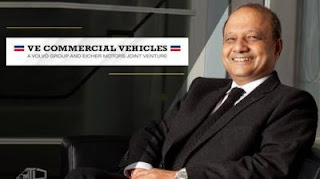Ramesh Kumar from Greater Noida
Honestly, it was our maiden mulaqat, though we have known each other for over a decade. Forty-eight hours before the face-to-face interaction, Chandigarh Transport Association Secretary-General Bajrang Sharma tweeted: "Welcome to Chandigarh for new suggestions for welfare of industry/trade." Actually, he identified challenges and offered possible solutions. Not me!
"Over the next ten years, my son will be running his business in a much better India," thus spake Sharma. We are seated in the well-lit lobby with Chattisgarh tribals hand-built non-ferrous Dhokra art figurines kept vigil from five feet away.His confidence was unmistakable. There was that special glow on his face signaling a truckload of optimism. You rarely come across a non-sulking transporter. Not today. Never in the past. Sulking is part of their DNA, even when milking clueless shippers with incredible and usurious freight rates.
Not that the fifty-ish second generation Punjabi fleet owning transporter has no laundry list. He, too, has. His major grouse is the corruption on highways. "Mind you, it has come down," he addresses *Freight Tiger's Sakshi Hingorani and Madhusudhan Nair,* and self as we listen with rapt attention in the reception area of The Lemon Tree in Mohali industrial area phase 1.
The hotel staff at the counter and the men, women, and children exiting the elevator for the dining hall are unconcerned with our activities.
Madhu, a professional who had learned his logistics funda at the corridors of DHL and Varuna, among others, is all ears. In his new avatar at the Mumbai-based start-up Freight Tiger's Business Development in charge for the northern region, the hardcore Delhiite is on a whistle-stop tour to Chandigarh and nearby Baddi (Himachal Pradesh) to assess the ground. His mission is to push his company's services to "improve the operational efficiency and thus reduce the logistics cost" among the transport fraternity. Indeed, the upcoming National Logistics Policy's unambiguous goal. Young and sprightly Sakshi, the US-educated marketing and communication specialist, flew in from Mumbai to give company to Madhu on his whirlwind tour.
"My wish list is short and simple: Primarily, I desire the corruption on highways has to be eliminated," says the cherubic Sharma and hastens to admit that it is a "tall task." He believes the government has made efforts in that direction to a certain extent, but a lot more is possible.
"How about creating a National Highway Security Force - something on the lines of CISF?" asks the CTA boss.
Highway patrolling? Is it possible to police the entire stretch of national and state highways that connect the entire country, feeding, clothing, and sheltering 1.3billion populace 24x7x365? Madhu and I exchange glances disbelievingly. Sharma catches the nuances and smiles to assuage that he is "not hallucinating."
"I am confident such a force would reduce harassment on highways by hooligans as well as other rent-seekers," adds he. Total elimination of corruption on highways, Sharma concedes, is impossible. "Bring it down to 20%. That would be wonderful," says he, like a child whose wish to buy a stick of ice cream got parent's approval.
Sharma desires that his eldest son, running his cold chain trucking business, should not get disheartened and shut the family business started by his father decades ago. That can only happen if the business environment improves with less corruption on highways because their business literally "runs" on the roads. His other son moved into the legal profession along with his lawyer-wife.
Sharma has solid legal support to fight any legal dispute in his business without paying a penny!
What next, Sharmaji? "The biggest pain point is the driver shortage." What's his solution? "Truck makers like Tata, Leyland, Eicher Volvo, Daimler should set up driver training schools and gift a trained and certified driver along with every vehicle they sell," says he.
Sakshi and Madhu are clueless as to how to react to this Sharma proposal. I break the ice.
"Sharmaji, you mean like "dowry"? So these truck makers will train and gift buyers with drivers?"
We laugh loudly, drawing the attention of the passers-by in the hotel lobby. Sharma presents a cool cucumber look.
"Recently, I met Eicher Managing Director Vinod Aggarwalji in Punjab and put forward this proposal to him," adds he.What was his response? I ask.
Vinodji said, "Let's see" to Sharma.
Honestly, I never expected anything beyond "Let's see" from Eicher bossman. Just not him. For that matter, anyone from the trucking segment. If these truck makers were serious, the topic of driver shortage would have never arisen today.
Sharma is hopeful his wishes will bear fruit in his son's lifetime, if not his own.
The clock is ticking. Sharma has an appointment with Chandi Mata at 9.10 for 10 minutes. Yes, you cannot "darshan" even the Akhilandeswari without an appointment in the Covid times. Plus, it is Navaratri, and he is fasting. So he has to "darshan" Mata before rushing home for dinner.
We shake hands and promise to meet again, possibly on a Punjab road trip.
"Sharmaji, please include these two items for submission to Chandi Mata. Only she can find a solution. Not Nitin Gadkari. Nor Channi," I add, as the elevator door shuts, swallowing him into its cavity to take him vertically to the ground floor.



